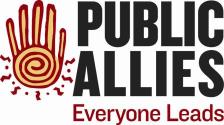Before my service with Public Allies, I was complacent about my future. My defenses were strong and impenetrable, as I learned early in life to keep my hopes and dreams and my lived experiences a secret. I learned to protect myself from suffering by hiding my personal identity and my cultural heritage. This has often been a precaution I’ve taken in order to avoid violence and discrimination, but it has also caused strain on my relationships and eventually developed into social anxiety. I thought that by keeping myself hidden away from others, I would keep myself safe. But what I’ve come to realize through my term of service with Public Allies is that living such a guarded life in fear and shame means living a life devoid of true connection.
My experience with Public Allies has been the nexus of what, to me, has arguably been the most important lesson I’ve learned about service leadership, and that is that leadership is about building relationships, not just making connections, and storytelling is a suitable conduit for that process. In sharing our stories, we invite others into our lives by showing our humanity. Personal stories of survival and resilience can be sites of healing and liberation for the both the individual and the collective community, as they cultivate a sense of belonging for people. We, as individuals, are the sole authorities of our own stories, and by sharing them with our communities, we gain the knowledge of our capacity as leaders and the power to realize that we are not alone in our struggles. Through telling our stories, we create a shared sense of purpose and can better collaborate toward common goals. This form of storytelling promotes authenticity and transparency in our service because it affords us the opportunity to be real with one another.
Over the last ten months, I’ve had the chance to tell my very own story many times to many different people. I entered this program as a social phobic, a person who couldn’t even call the local pizza shop to place an order for delivery. I was living in all-encompassing poverty, and I felt incapable of ever being anything more than a social failure. What I didn’t realize was that I was worthy of receiving compassion, love, and support just exactly as I was. I didn’t need to wait until I was deemed successful by society’s standards to be valued as a person and to share my story with others.
If my story has impacted you on some level, I hope that you will be inspired to take action in your own life. I encourage you to take an emotional risk, and share your story with someone. Your story can serve as a source of affirmation for yourself and for others who may be experiencing hardship or silent struggle. I ask you to make the choice to show up and be real with others. You will find that each time you do this, you become a little braver. I urge you to make yourself visible (where it’s reasonably safe to do so), to bear witness to your lived experience, and to be the bold authority of your own story while maintaining your personal boundaries. Embracing vulnerability does not mean that you have to become a doormat; you can abandon your fear of rejection and judgment by choosing to share your story with folks you can trust to meet you where you are with compassion and kindness. Lastly, if you happen to be the person with whom someone else has chosen to share their story, I hope that you will simply be present and listen, as you have listened to my story here.
I feel so very fortunate to have been given the opportunity to serve with Public Allies and to write for the Ally Snapshots blog. I never before imagined that I would ever have the resources to move out of poverty and to overcome my social anxiety. Before I became an Ally, I was struggling with severe depression and battling suicidal ideations. Through becoming involved with such a wonderful program and committing myself to serving my community, I have found my way back to my own path. Public Allies has not only changed my life; it has saved my life, as well.
Thank you for reading.









